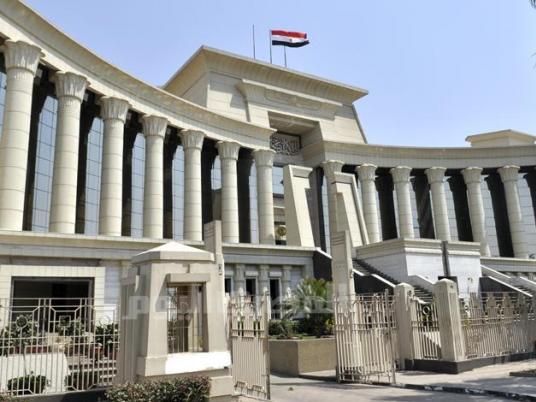
Amid an ongoing power struggle between the judiciary and the ruling Muslim Brotherhood, the fate of the Brotherhood-dominated Constituent Assembly was put in the hands of the Supreme Constitutional Court.
The Administrative Court on Tuesday referred a case against the formation of the Constituent Assembly to the court.
The case challenges Article 1 of Law 79/2012 empowering MPs to form the Constituent Assembly, arguing that the formation does not represent all sectors of society.
The referral of the case to the court could represent another chapter of an ongoing struggle between the judiciary and the executive, and more particularly, the SCC and the dominating Brotherhood current.
The most recent feud was manifest in the court’s reservations over its formation and powers in the new draft constitution. The new draft gives the president and other judicial bodies the authority to appoint the head of the court, which it sees as a violation of its independence, deeming its general assembly the only body capable of choosing its president.
Many observers’ initial reaction to the court ruling was that the referral to the court would be detrimental to the assembly and its constitution, given the thorny recent history between the court and Islamists. The SCC had previously ordered the law governing the parliamentary elections unconstitutional, a ruling that led to the dissolution of the Islamist-dominated Parliament in June.
President Mohamed Morsy, who is also a Brotherhood figure, attempted to reinstate Parliament, but quickly reneged on his decree following the court’s staunch criticism of his violation of its rulings. An earlier crisis erupted between the newly elected president and the court when he resisted being sworn in before its judges, but had to eventually give in.
However, the referral was not necessarily seen by Islamists as an ominous outcome. They responded joyfully to the court ruling Tuesday, chanting “God is great.”
Abdel Moneim Abdel Maqsoud, a Brotherhood lawyer, says the Administrative Court’s ruling is a “positive” one and will enable the Constituent Assembly to conduct its work on time and produce the long-awaited constitution.
With its fate in the hands of a body that has expressed disapproval of its work, the Constituent Assembly is racing to finalize the constitution and hand it to the president to put forward for a referendum before the court reaches a verdict.
“According to the standard procedures, the SCC takes a minimum of 45 days to issue a verdict. This will be enough for us to finish the draft and hand it to the president,” says Constituent Assembly member Mohamed Mohey Eddin.
Mohey Eddin says the assembly is expected to finish the draft by the end of the year, before the court gets the chance to issue a verdict.
Meanwhile, for some, the very involvement of the court in the case is questionable.
Constitutional expert Tharwat Badawy says the SCC is not in a position of power.
“This is not an administrative decision to be reviewed by the Administrative Court, nor a legislative one to be reviewed by the SCC. Both courts are not specialized,” says Badawy. “In the meantime, the assembly is immune according to this law.”
The law challenged in court was passed by Parliament in June, but the then-ruling military council refused its ratification. After his election, Morsy passed the law in July, using his legislative powers.
The law stipulates that the Constituent Assembly acquire an independent character immune from the interference of all state institutions and bodies, including the president.
Badawy claims that this law gives the assembly a sovereign stature and puts it outside the jurisdiction of the judiciary.
If the constitution passes a referendum before the SCC reaches a verdict, as expected, Badawy says the court would not have the power to annul the newly passed constitution.
“The constitution overrules any court,” he says.
In April, the Administrative Court dismantled the first Constituent Assembly formed by the now-dissolved Parliament, on the basis that the assembly — half of whose members were MPs — violated Article 60 of the Constitutional Declaration, which regulated the assembly’s formation without specifying the criteria with which to choose its 100 members. The current assembly was then formed in June, with only 39 MPs.
This piece appears in Egypt Independent's weekly print edition.




